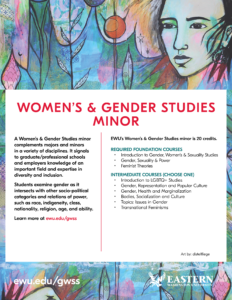About
Our courses offer deeper insight into issues of oppression and create awareness of sexism, racism, and other biases. Our faculty teach you to expand your way of thinking, broaden your perspective, analyze difficult material, build convincing arguments and understand how gender interactions affect the business environment, as well as the cultural, emotional, familial, institutional and political impact.
Women’s and Gender Studies minor courses can be taken in partial fulfillment of the Bachelor of Arts in Interdisciplinary Studies degree.
Click the flyer image below to find out more:
